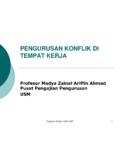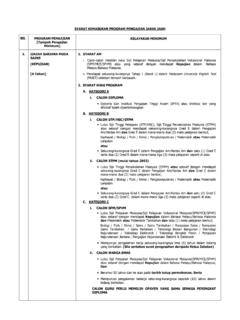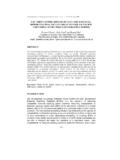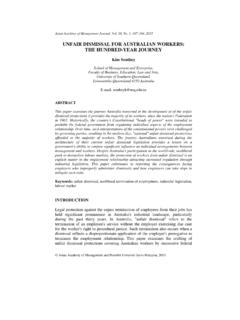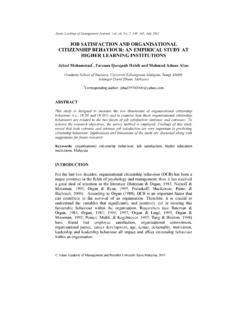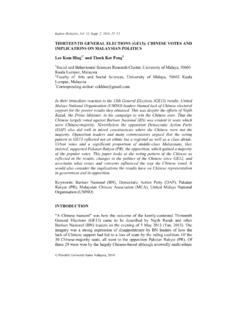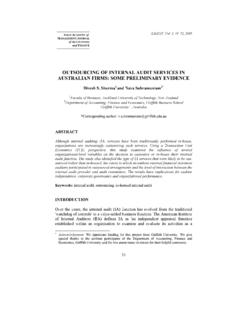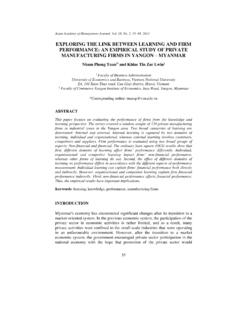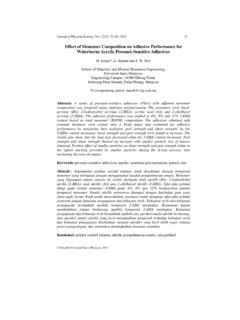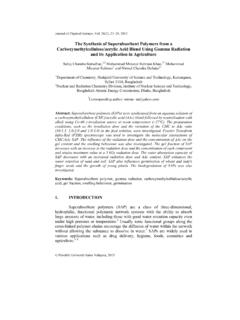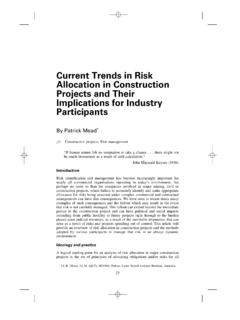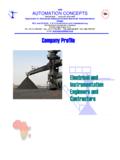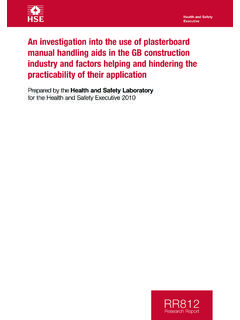Transcription of Nature of the Construction Industry, Its Needs and …
1 Journal of Construction in Developing Countries, 20(2), 115 135, 2015 Penerbit Universiti Sains Malaysia, 2015 Nature of the Construction industry , Its Needs and Its Development: A Review of Four Decades of Research 1* George Ofori2 Abstract: The Construction industry is not well understood. There is no common definition, and there are even arguments about whether it is an industry or a sector that comprises many industries. The contribution of the Construction industry to economic growth and long-term national development is widely acknowledged, highlighting its importance, particularly to developing countries.
2 For the benefit of these countries, it is important to investigate the Nature , essential characteristics and particular requirements of the Construction industry and to use them to develop programmes for its improvement. A research programme that started in 1974 and is still continuing is discussed. The subjects studied in the research programme have included the Nature of the Construction industry , its importance in development, its Needs and its development. Elements of the process of Construction industry development that have been studied include ways and means of improving the performance of Construction firms, focusing on contractors and technology development.
3 The findings from these early studies influenced the formulation of policies and legislation for establishing Construction industry development agencies in a number of countries. Other aspects of the Construction industry that are studied in the research programme include the parameters of performance in the industry , such as productivity and environmental performance. An information technology framework for Construction was also developed. As the world entered the information age, the implications for the industry were also studied. Finally, the concepts of leadership, ethics and transparency and their importance on Construction projects and in the Construction industry were also studied.
4 The focus here is on industry development and its application to the delivery of housing. It is suggested that effective methods should be found to reduce the tendency to duplicate studies and to effectively build on relevant findings over time. A research agenda is proposed. Keywords: industry development, Technology development, Environmental performance, Leadership INTRODUCTION Construction industry and Its Development The literature shows that the Construction industry is an important sector of the economy and plays a key role in national social and economic development (Turin, 1973; Ofori, 1990; 2012a; Hillebrandt, 2000; Lopes, 2011).
5 The Construction industry has peculiar features that need to be understood if it is to be able to perform effectively and efficiently. The author's research programme has been motivated by a desire to make a contribution to both knowledge and practice (in providing the basis for policy formulation and implementation by governments and companies). 1 Department of Building, School of Design and Environment, National University of Singapore, SINGAPORE Corresponding author: George Ofori 116/PENERBIT UNIVERSITI SAINS MALAYSIA Research Aim and Objectives The aim is to present a research programme on key aspects of the Construction industry , with special reference to the developing countries, that started in 1974 and is still continuing.
6 The focus is on the development of national Construction industries to enable them to meet the huge backlog of Needs and demand and in light of the peculiar challenges of their operating environments and the resources available to them, to enhance their performance for the benefit of their clients, users and society. The objectives are: 1. to outline the topics studied in the particular segment of the research programme and the relationships among them, 2. to consider the milestones and influencing factors in that part of the programme, 3. to discuss the main findings from the studies and their theoretical and practical implications, 4.
7 To propose measures to be taken to build sustainability, continuity and organic development in the research on Construction in developing countries and 5. to suggest a research agenda. The research programme started in 1974 with an undergraduate dissertation. The main subjects of the programme have included: Construction industry development, industry performance, strategic management, international Construction and leadership. The focus in this study is on industry development. Works on housing are used to demonstrate the application to practical issues in the lives of beneficiaries.
8 THE RESEARCH PROGRAMME The Origins The undergraduate dissertation in 1974 studied the ways and means of ensuring effective communication with small contractors on Construction projects in Ghana. During internships, the author found that most of the contracting companies were led by persons with no education in Construction . Thus, the "good practice" contract documentation and procedures were largely ineffective, if not inapplicable. The questionnaire-based field study of the leaders and members of the main contractors association confirmed this.
9 It was proposed that the extensive standard specifications that mostly remained unused should be replaced with some notes of key points on drawings. The author's interest and research skills in Construction industry development were honed during a master's programme. The philosophy of strategic consideration of the Construction industry was pioneered at the Bartlett School of University College London. The late Professor Duccio Turin (1926 to 1976) was the leader of the research. Turin's (1980) inaugural lecture in 1966 was a seminal piece entitled What Do We Mean by Building?
10 Groak (1992) took up the Nature of the Construction industry : A Review PENERBIT UNIVERSITI SAINS MALAYSIA/117 theme and later summarised it in his book The Idea of Building. These ideas formed the basis of the academic ethos of the school and formed the author's academic make up. Such strategic, macro-level consideration of Construction was in sharp contrast to what other researchers were concerned with issues at the project level with a focus on tactical matters and tools. Turin (1973) led studies on the role of the Construction industry in national development.
